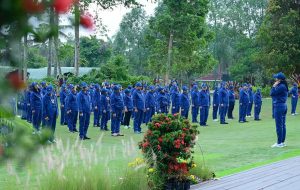Indonesia’s Defense Ministry published a full-page advertisement in the country’s largest newspaper yesterday, defending the government’s decision to allow the military to run non-defense-related government programs.
Since taking office in October of last year, President Prabowo Subianto has presided over a broad expansion of the military’s role in governance. After taking his cabinet on a four-day military-style retreat at the National Military Academy after his inauguration, the 73-year-old former general has used the military for various tasks, including the implementation of his free school lunch program and his administration’s food security initiative.
This has prompted concerns and protests about a revival of the New Order regime, in which the military, under the doctrine of dwifungsi, or dual function, enjoyed a formal role in politics and governance.
According to a report by Reuters, the Defense Ministry’s advertisement, published in the Kompas newspaper, hit back at such concerns, arguing that its policies have expanded and transformed “into people’s defense based on prosperity and cross-sector collaboration.”
The advertisement, which bore the title “No Longer Just Military: Indonesian-style People’s Defense,” said that the ministry was helping to “build national resilience,” in Reuters’ paraphrase. It specifically mentioned 10 programs in which the military was playing a role, including the free meal scheme, the manufacture of medicines in military labs, and the establishment of 100 new battalions assigned to tasks in the health and agriculture sectors.
In the advertisement, the Ministry said that it had trained and equipped thousands of young graduates with “military approaches,” who had gone on to head kitchens providing a free meals program across Indonesia. The ministry also said the number of battalions active in the health and agriculture sectors was expected to reach 500 over the course of Prabowo’s term, and that they aimed to “safeguard government strategic programs.”
While the advertisement amounts to a recognition of the public concern about the growing militarization of Indonesian governance, it is unlikely to allay the concerns of students, activists, and others who have been highly critical of the slow erosion of the firewall that was erected between the civilian and military spheres after the fall of Suharto in 1998.
Among the most significant changes came in March, when lawmakers approved changes to the 2004 Indonesian Military (TNI) Law, expanding the government’s ability to appoint serving military officers to civilian positions. Previously, the TNI Law permitted only active military officers to serve in 10 mostly security-related institutions, such as the Ministry of Defense and the state intelligence agency. This has now been extended to include five more agencies: the Attorney General’s Office, National Disaster Mitigation Agency, National Counterterrorism Agency, Indonesian Maritime Security Agency, and National Agency for Border Management.
As Made Supriatma, a visiting fellow at Singapore’s ISEAS-Yusof Ishak Institute, told The Guardian last month, this drift of military involvement into civilian functions could create administrative chaos.
“Even without the formal dual function – dwifungsi – policy, you will see the military everywhere, having influence or control in politics, in policy, in government,” he told the newspaper. “They will be doing things that they are not supposed to do, where they have no expertise.”
In addition to threatening to erode the democratic safeguards set up during the period of Reformasi in the late 1990s, such an expanded role could also be detrimental to the military’s core functions, as Muhammad Fauzan Malufti noted in these pages earlier this month.
“Every day soldiers spend on crowd control, or other non-defense roles, is a day not spent training for ‘real’ military operations, joint exercises, or high-end missions,” he wrote. “Resources – whether budgets, logistics, or leadership attention – are finite. The more they are spent on domestic policing, the less is available for strengthening external defense.”





























